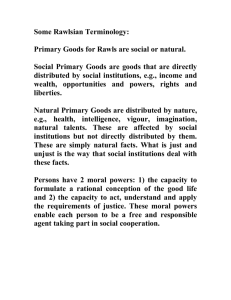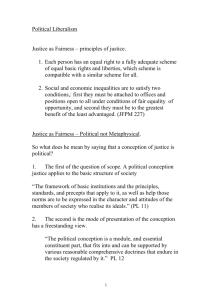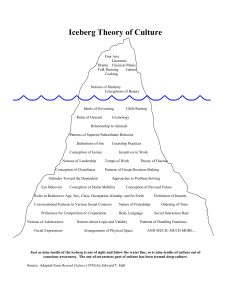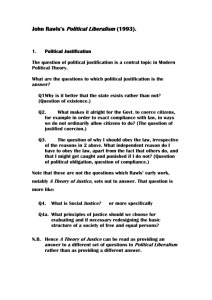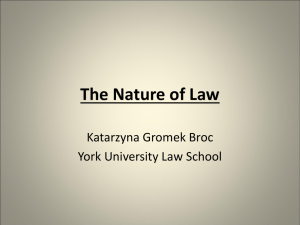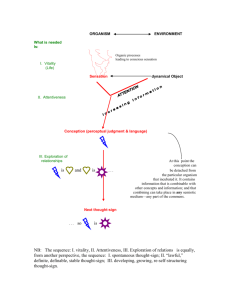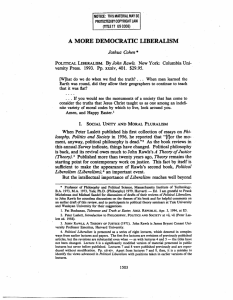The charge of ethnocentrism TJ purported to offer a neutral and
advertisement
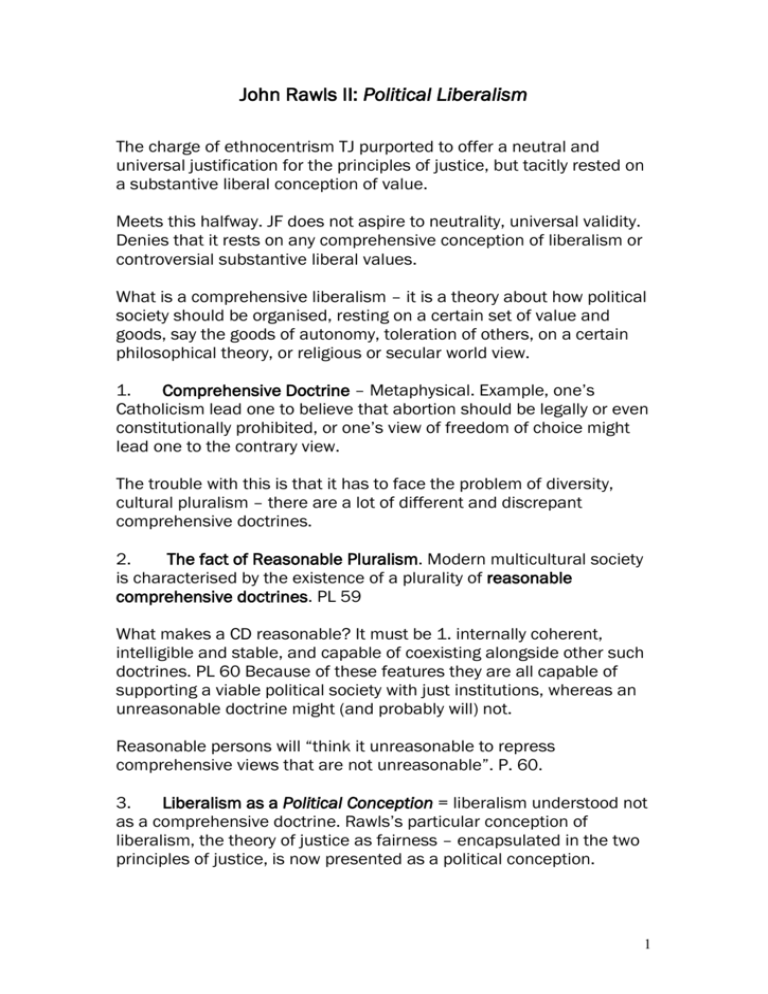
John Rawls II: Political Liberalism The charge of ethnocentrism TJ purported to offer a neutral and universal justification for the principles of justice, but tacitly rested on a substantive liberal conception of value. Meets this halfway. JF does not aspire to neutrality, universal validity. Denies that it rests on any comprehensive conception of liberalism or controversial substantive liberal values. What is a comprehensive liberalism – it is a theory about how political society should be organised, resting on a certain set of value and goods, say the goods of autonomy, toleration of others, on a certain philosophical theory, or religious or secular world view. 1. Comprehensive Doctrine – Metaphysical. Example, one’s Catholicism lead one to believe that abortion should be legally or even constitutionally prohibited, or one’s view of freedom of choice might lead one to the contrary view. The trouble with this is that it has to face the problem of diversity, cultural pluralism – there are a lot of different and discrepant comprehensive doctrines. 2. The fact of Reasonable Pluralism. Modern multicultural society is characterised by the existence of a plurality of reasonable comprehensive doctrines. PL 59 What makes a CD reasonable? It must be 1. internally coherent, intelligible and stable, and capable of coexisting alongside other such doctrines. PL 60 Because of these features they are all capable of supporting a viable political society with just institutions, whereas an unreasonable doctrine might (and probably will) not. Reasonable persons will “think it unreasonable to repress comprehensive views that are not unreasonable”. P. 60. 3. Liberalism as a Political Conception = liberalism understood not as a comprehensive doctrine. Rawls’s particular conception of liberalism, the theory of justice as fairness – encapsulated in the two principles of justice, is now presented as a political conception. 1 “Justice as Fairness: Political not Metaphysical.” Philosophy and Public Affairs, Vol. 14, No. 3. (Summer, 1985), pp. 223-251 Political conception = i. It is “a moral conception worked out for a specific kind of subject” namely “the basic structure of society” i.e. its main social, political and economic institutions. N.B. By moral he means – based on values. (PL 11) Moreover, based on “very great values” that are “not easily overridden” and that can be affirmed for their own sake. (PL 139) (moral) He does not mean based on a comprehensive moral doctrine that can serve, among other things, as a general theory of right conduct. That is precisely what a justice as political conception is designed not to be. (Moral) ii. A political conception of justice is “presented as a free standing view” p. 12. “It is neither presented as nor derived from such a doctrine” i.e. a comprehensive moral doctrine – GF] p. 12 “It is a module, an essential constituent part, that fits into and can be supported by various reasonable comprehensive doctrines… .” PL 12 iii. The content of a political conception of justice “is expressed in terms of certain fundamental ideas seen as implicit in the public political culture of a democratic society.” PL 13 So PL (unlike TJ) presupposes the institutions of liberal democracy and the existence of a liberal democratic culture, and can be understood as an elucidation and defence of it. One consequence of this is that its claim to neutrality is weakened. It is not a moral theory (or normative theory of justice) developed from non-normative ideas such as the idea of rationality, and the idea of a person, and the idea of society as a fair co-operative venture between free and equal persons. The order of explanation is normative (and moreover liberal democratic) all the way up, from the premises to the conclusions. 2 One implication of this – which might be thought an advantage or disadvantage depending on the situation – might be that prima facie Political Liberalism has nothing to say on the question of why nonliberal societies, or societies in which there is no liberal democratic tradition and culture, should become liberal democratic societies. Condoleezza Rice and John Bolton cannot use it to support their foreign policy of exporting liberal-democracy by military means. Offers little hope to Eastern European and former Soviet states which lack a liberal democratic tradition, but the citizens of which want to develop liberal societies. Federal Republic of Germany was in 1945 just such a country, and now is one of the most successful liberal democratic European States. 4. The Idea of an Overlapping Consensus (of reasonable Comprehensive doctrines) 3 The idea of an overlapping consensus is that there are certain fundamental ideas implicit in the public political culture that are very widely shared and hence not controversial, even though they are moral ideals in the first sense specified above not the second. What are these fundamental ideas? a) The idea of society as a fair cooperative venture between free and equal citizens or as a “fair system of cooperation over time” p.14. + Two companion ideas a1) a2) The idea of a citizens as free and equal persons The idea of a well-ordered society as a society effectively regulated by a political conception of justice These ideas can be shared by every (or nearly every) reasonable person, whatever comprehensive doctrine they may affirm (if any) and thus provide a workable and stable overlapping consensus. If these ideas support a conception of justice, such as Rawls justice as fairness as encapsulated in his two principles of justice, then that conception of justice can be presented as freestanding, and can provide the basis of social stability (for the right reasons) and the basis of a legitimate political order. OP still there, but now is given an ancillary elucidatory role, rather than a primary justificatory role. OP models these ideas that are implicit in the political culture. SO if it can be shown (as TJ purports to do) that Rawls two principles of justice would be chosen by persons in the original position standing behind a veil of ignorance, that shows that these principles can form the central organising idea of a political conception of justice. 5. Epistemic Abstinence or doing without truth. What the OP does not now show is that Rawls principles of justice are the true principles of justice. Rawls may regard them from the point of view of his own comprehensive liberal doctrine as the true principles, but given the fact of reasonable pluralism, he cannot expect every citizen to so regard them. For this reason he claims that justice as 4 fairness as a political conception – political not metaphysical – “does without the concept of truth.” PL (94) This strategy or method of avoidance – Jo Raz calls it the method of epistemic abstinence. Raz “Facing diversity: The Case of Epistemic Abstinence” Philosophy and Public Affairs, Philosophy and Public Affairs, Vol. 19, No. 1, 3-46. Winter, 1990. Republished in his Ethics in the Public Domain, Oxford 1990 Raz claims that Rawls cannot “do without truth”, and fails in the attempt, since to claim that a certain conception of justice as fairness is the right conception for us, just is to claim that it is ‘true’. 6. Neutrality Neutrality is a polysemous and thus misleading word. It can mean: procedural neutrality “ by reference to a procedure that can be legitimated or justified without appealing to any moral values at all,” or by appeal to neutral values…such as impartiality, consistency in application of general principles…and equal opportunity for the contending parties to represent their claims.” P. 191 “Justice as fairness is not procedurally neutral.” PL 191 why not? It is neutral in the sense that it seeks to base a political conception of justice on “common ground – or if one prefers neutral ground – “ i.e. the overlapping consensus of reasonable doctrines. P. 191 Neutrality of aim: p. 193. a) that the state is to ensure for all citizens equal opportunity to advance any conception of the good they freely affirm. b) that the state is not to do anything intended to favour or promote any particular comprehensive doctrine rather than another… 5 c) that the state is not to do anything that makes it more likely that individuals accept any particular conception rather than another unless steps are taken to cancel or to compensate for the effects of policies that do this. a) PL NO b) PL Yes but only among reasonable comprehensive doctrines c) PL No this is impossible and undesireable Neutrality of effect: Neutrality of Justification? 7. The Idea of Public Reason 6
